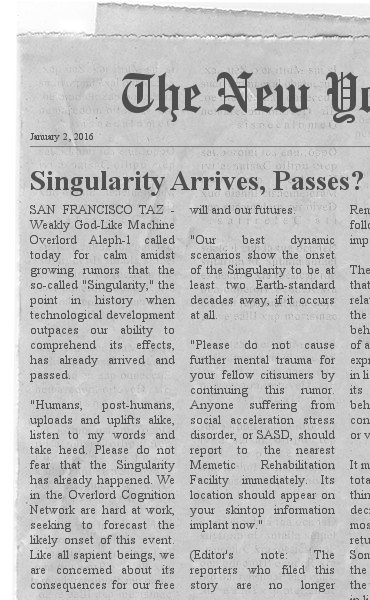Sensational News
Stephen Glass an ex writer for the popular magazine “The New Republic” was just an example, not the exception, of how the media can be utilized in the wrong direction. Mr. Glass during his employment for "The New Republic" fabricated articles, quotes, sources and events. 27 out of the 41 stories published by the magazine contained some or total false information. What was his main motivation for creating all these stories? I sum it up in one word “Sensationalism.” Mr. Glass was unable to secure stories that created popular interest so he chose to invent them instead. These stories were what people wanted to read. The kind of story that makes reporters famous and the media rich and it is still going on in different places.
“Sensational news, as it spreads through the media, can easily push other issues off the front pages and out of the public’s eye. Sensationalism can be a pleasurable diversion, but this diverting has political implications.” Ref. “Looking at the Sun” packet. 3rd page.
 The New York Times recently published an article questioning the character of presidential candidate Senator McCain. This created large controversy among Republicans, Democrats, and Independents alike. One of the issues taken by the public is that the “Times” has not provided proof of any sort, that there is valid, substantial information behind the story. They cite unnamed sources and they had access to this story for at least two months and were debating as to whether or not it should be printed, so why now? I think this is a clear example of how the Times give the press a bad name. They have no substantial proof of their writings and yet they are irresponsible enough to go the old ways of sensationalism to sell more papers.
The New York Times recently published an article questioning the character of presidential candidate Senator McCain. This created large controversy among Republicans, Democrats, and Independents alike. One of the issues taken by the public is that the “Times” has not provided proof of any sort, that there is valid, substantial information behind the story. They cite unnamed sources and they had access to this story for at least two months and were debating as to whether or not it should be printed, so why now? I think this is a clear example of how the Times give the press a bad name. They have no substantial proof of their writings and yet they are irresponsible enough to go the old ways of sensationalism to sell more papers.An interesting example of media diversion has been cited by critics of ex President Bill Clinton. During his impeachment hearing in 1998, Operation Desert Fox, 4 day bombing campaign, occurred at the same time as the impeachment hearings. Was this a coincidence or diversion from one story to another?
Media and responsibility do not always go together.












